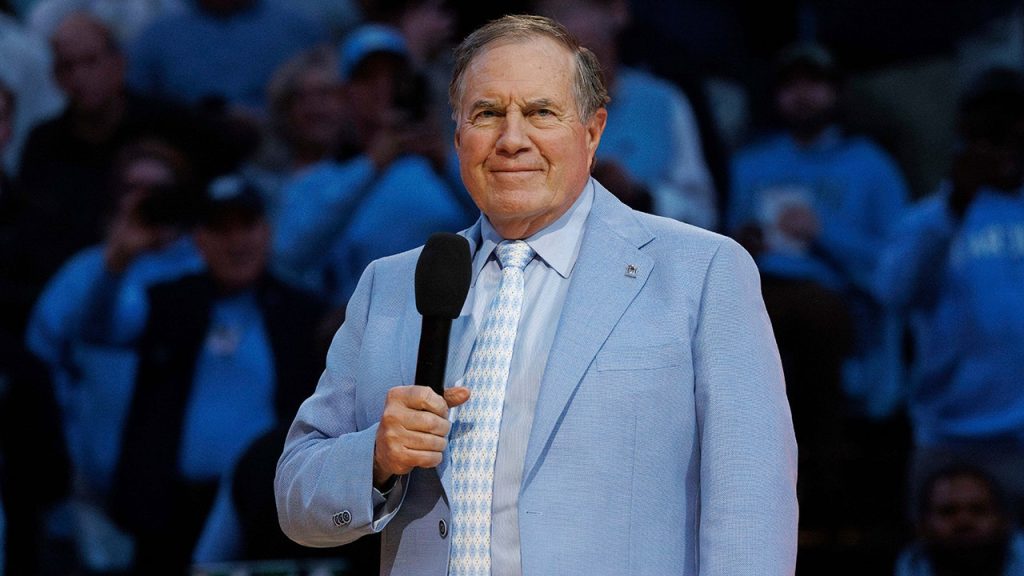The Unforeseen Transition: Bill Belichick Ventures into College Football
The football world reverberated with astonishment following the announcement of Bill Belichick’s decision to helm the North Carolina Tar Heels football program. This unexpected move marks a significant departure for the legendary coach, a figure synonymous with NFL success, who, at 72, ventures into the collegiate arena for the first time in his storied career. Belichick, a seasoned veteran with a distinguished track record in the professional league, including multiple Super Bowl victories with the New England Patriots and New York Giants, has never coached at the college level. His coaching journey began with the Baltimore Colts in 1975, and since then, his name has become synonymous with NFL dominance. This sudden shift to the collegiate sphere has baffled many, including former players and analysts, who question the rationale behind such a drastic transition at this stage of his career.
Tedy Bruschi, a former linebacker under Belichick’s leadership, expressed his bewilderment on ESPN’s "Sunday NFL Countdown," emphasizing the incongruity of seeing Belichick coaching in a less prestigious bowl game compared to the Super Bowl stage he commanded for so long. He acknowledged Belichick’s ability to elevate any team he coaches, making even struggling programs immediately relevant and competitive. Bruschi emphasized the coach’s inherent talent for player development, highlighting the transformation of Tom Brady and Rob Gronkowski into iconic figures under Belichick’s tutelage. The linebacker’s incredulity reflects the widespread sentiment of disbelief among those who have witnessed Belichick’s unparalleled success in the NFL.
Julian Edelman, another former player of Belichick, offered a more nuanced perspective on the move, suggesting that while initially surprising, the decision becomes comprehensible upon closer examination. He pointed to three key factors contributing to Belichick’s decision: his exceptional player projection skills, his sentimental connection to North Carolina (his father having coached there), and the allure of coaching a team associated with the iconic Michael Jordan brand. Edelman emphasized Belichick’s knack for identifying and nurturing talent, citing the remarkable development of players like Tom Brady and Rob Gronkowski as prime examples. The nostalgia factor, rooted in his father’s coaching tenure at North Carolina, adds a personal dimension to the decision. Finally, the opportunity to associate himself with the prestigious Jordan brand and the Tar Heels’ iconic powder blue uniform adds another layer of appeal.
Belichick’s departure from the NFL also sparked curiosity about potential openings with other teams, particularly the New York Jets, a franchise with a complex history with the coach. Despite past tensions, there were inquiries about his potential interest in returning to the Jets, but ultimately, the North Carolina opportunity prevailed. The move marks a significant shift in the NFL landscape, leaving a void that will undoubtedly be felt across the league. The decision raises questions about the future of both the Patriots and the other teams that might have benefited from Belichick’s leadership. It also signifies a new chapter in college football, as a coach with an unparalleled NFL pedigree enters the collegiate ranks, bringing with him a unique set of skills and experiences.
Belichick replaces Mack Brown at North Carolina, inheriting a team with a 6-6 record and a pending appearance in the Fenway Bowl against UConn. Interim coach Freddie Kitchens will lead the team in the bowl game, marking a transition period before Belichick officially takes the reins. The Tar Heels have consistently participated in bowl games in recent years but have struggled to achieve consistent success, managing only one 10-win season since 1998. Belichick’s arrival brings a sense of anticipation and hope, with expectations high for his ability to transform the program into a consistent contender.
This unexpected move by Belichick prompts a deeper examination of the factors driving coaches’ decisions and the dynamic interplay between the NFL and collegiate levels. The significance of his departure from the NFL cannot be overstated, leaving a void that will be difficult to fill. Simultaneously, his arrival at North Carolina injects new life and excitement into the college football landscape. The sports world will eagerly watch to see how Belichick adapts to the collegiate environment and the impact he has on the Tar Heels program in the coming years.

